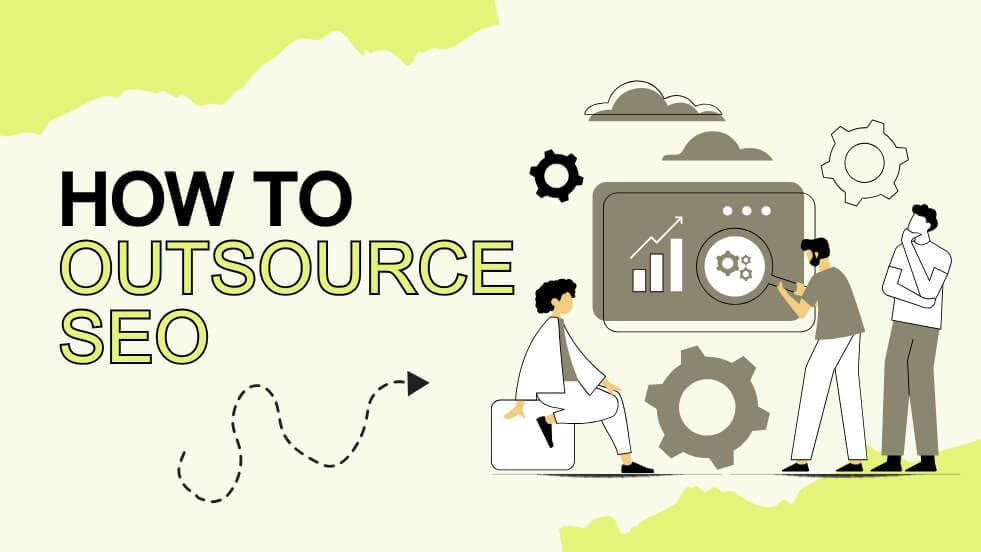Visibility is the one crucial factor that determines the success of a website. In this online world, Search Engine Optimization (SEO) is the key to driving traffic and establishing a strong digital presence. However, mastering SEO requires time, expertise, and resources—making it essential to explore outsourcing as a strategic solution.
Through SEO and creating highly quality blog content, I was able to lay a strong foundation for success in 2022, thereby breaking six figures in 2023. If you’re in a situation where you need help with SEO, then outsourcing will be your option.
Outsourcing SEO will be an investment that will help you achieve your objective of success.
Get ready to reach the top. Here, I’ll share with you the following parts you need to know to help your goals:
- How to Outsource SEO?
- Types of SEO Outsourcing
- Benefits of Outsourcing SEO
- Challenges of Outsourcing SEO
- Things to Consider When Choosing an SEO Agency
How to Outsource SEO Efficiently and Effectively?
Outsourcing SEO is like handing the keys over to an expert. You know the end goal—boosting your website’s visibility—but instead of handling every little detail yourself, you let someone else take over the technical stuff.
As a matter of fact, according to Forbes, between 2020 and 2030, there will likely be a 22% growth in demand for SEO positions, creating job opportunities for SEO experts across a range of industries.
Outsourcing SEO can feel overwhelming at first. It may seem like a major step, but after breaking the process down into smaller steps, you can see that it’s doable.
Here are the steps you can follow and I will share my thoughts in detail:
- Clarify Your SEO Goals First
- Do Your Research and Find the Right SEO Partner
- Set Clear Expectations and Deliverables
- Provide the Necessary Information to the SEO Agency
- Keep Track of Progress and Adjust as Needed
Step 1: Clarify Your SEO Goals First
Before reaching out to any businesses, it is essential to have a clear understanding of your goals. What are your SEO objectives? Better rankings for specific keywords, more visitors to your website, or perhaps a complete technical overhaul?
I failed by diving in too soon without a defined objective, but as I took the time to identify what I wanted, everything became a lot clearer.
Setting specific goals helps your agency develop a plan that supports your vision and guarantees that you can connect with them effectively. Knowing your objectives is the first step toward success, regardless of whether you’re looking for long-term development or certain short-term outcomes.
Step 2: Do Your Research and Find the Right SEO Partner
Selecting the best SEO agency to collaborate with comes when you have a clear idea of what you want. You can initially feel overwhelmed by the number of choices available. Every agency seemed to offer the same services but through research, you can identify the best course of action
- Experience: Look for agencies with experience in your industry or with similar businesses.
- Reputation: Check reviews and testimonials to see how other clients feel about their services.
- Communication style: Pay attention to how they interact with you. Do they explain things clearly? Are they transparent about their strategies?
Getting in touch with a few agencies will help me determine whether they are a suitable fit for my company and how they handle SEO.
Step 3: Set Clear Expectations and Deliverables
Clearly defining your expectations is essential when you’ve chosen an SEO provider. This entails determining the services you require and settling on the price and schedule. Don’t forget to discuss the following:
- What services will be provided: Will they handle on-page SEO, technical SEO, content creation, link-building, or all of the above?
- Timeline: SEO results take time, so setting a realistic timeline for progress is important.
- Budget: Be clear about the cost and what’s included in the fee. This will help avoid any surprises as you continue with your SEO journey.
Both parties can avoid misunderstandings and have the same goal throughout the project if you clear these points.
Step 4: Provide the Necessary Access
To begin, the SEO team will require access to specific data to perform their duties effectively. Giving someone else access to your website can be frightening, but it’s an essential step. I’ve included the following to get you started:
- Google Analytics: This allows the team to see how users are interacting with your site and where traffic is coming from.
Source: Google Analytics
- CMS access: Whether you use WordPress, Shopify, or something else, you must be able to edit and optimize your site’s content.

- SEO reports or previous audits: If you have done some SEO work before, providing them with past reports or audits can help them have a good start.
Step 5: Keep Track of Progress and Adjust as Needed
Outsourcing SEO requires active engagement to be successful. Regularly reviewing progress with your SEO agency is important to remain in line with your goals. Monitoring KPIs such as traffic, rankings, and conversions can help maintain transparency and ensure that the strategies implemented are working towards the desired results.
- Traffic growth: Are more people visiting your site?
- Keyword rankings: Are the keywords you’re targeting moving up in the rankings?
- Backlink quality: Is your backlink profile growing with high-quality links?
Regular reports and progress updates help ensure you’re on the right path and allow for adjustments if necessary. It’s a must to be patient but at the same time proactive when you start your SEO journey.
Types of SEO Outsourcing
You are not leaving your business completely. You have to be involved in every aspect and monitor the development. Be sure to follow up with your SEO provider on a regular basis to monitor important performance metrics such as:
Allowing your content to improve its online presence with the help of SEO services is beneficial for a marketer. Semrush mentioned that 53% of marketers agreed that increasing the value of their content has improved their search rankings.
Based on my experience, here’s a breakdown of the key types of SEO outsourcing you can consider.
We’ll discuss the following SEO types that you can entrust for outsourcing:
- On-Page SEO outsourcing
- Off-Page SEO outsourcing
- Technical SEO outsourcing
- Local SEO outsourcing
On-Page SEO Outsourcing
On-page SEO involves optimizing content, meta tags, and keywords. The right SEO team can always tweak your content to make improvements in your search engine rankings as well as the user experience.
Focusing on well-researched keywords and quality content will make your site more appealing to search engines as well as visitors.
Off-Page SEO Outsourcing
Off-page SEO focuses on a site’s reputation via backlinks and external mentions. You can see an immediate improvement in your rankings depending on the progress of their strategies.
Obtaining quality links from authoritative sites can greatly increase the authority and visibility of your site. Developing a great backlink profile can make your website more competitive in your niche.
Technical SEO Outsourcing
Technical SEO would represent optimizations behind your website which make it more performant, in terms of improving the speed of your site for better mobile friendliness, hence fixing broken links.
A well-optimized technical foundation ensures that search engines can crawl and index your site without issue.
Local SEO Outsourcing
Local SEO is all about targeting customers in your area. It’s essentially very important for businesses that want to show up in local searches or Google Maps. This type of SEO is important for companies looking to differentiate themselves in local searches and bringing in regional customers.
Outsourcing SEO activities, including technical, local, off-page, and on-page SEO, can improve the performance of your website. Each type focuses on particular aspects, like backlinks, content optimization, site functionality, and local visibility which effectively raise your site’s ranks and user experience.
Benefits of Outsourcing SEO
Businesses can benefit much from outsourcing SEO, and I’ve seen it work for many others as well. If you’re new to outsourcing SEO, it means giving SEO professionals the task of improving your website.
As stated by Intergrowth, 68% of online journeys start with a search engine, therefore it will enable you to concentrate on managing your business while achieving a higher position in search engine rankings.
After all, it will always be our goal to reach the top just as Klipfolio mentioned that 91.5% of all traffic goes to websites that show up on Google’s first page.
With my knowledge in this niche, here are the key benefits of outsourcing SEO:
Access to SEO Expertise
Access to SEO specialists who are knowledgeable about the newest tactics, tools, and trends is one of the main benefits. Seeing how much more experienced the experts were than what we could accomplish on our own can be eye-opening.
- Experts can quickly adapt to algorithm changes.
- They leverage advanced tools to enhance performance.
Save Time and Effort
Because SEO can take a lot of time, many people find that outsourcing makes sense. It enables companies to assign experts to tasks like content strategy and keyword research.
In this manner, you can avoid being stuck in technical details and concentrate on aspects like business growth and client interaction where your abilities shine.
- Spend less time on repetitive SEO tasks.
- Focus more on high-priority business areas.
- Avoid repetitive SEO tasks and technical details.
Cost-Effective SEO Solutions
Hiring an in-house team can be far more expensive than outsourcing. You don’t have to be concerned about paying, training, or keeping SEO employees. Additionally, the return on investment from successful SEO typically exceeds the initial outlay.
- Save on overhead costs related to hiring an in-house team.
- Pay only for the specific services you need.
- Achieve higher ROI with successful SEO strategies.
Improved Efficiency and Results
Effective processes are already in prepared at SEO agencies. I saw how rapidly they could apply complex techniques through outsourcing, producing quicker, more effective outcomes.
- Faster implementation of SEO strategies.
- Improved overall quality and execution.
- Leverage the expertise of experienced SEO agencies.
Scalability for Your SEO Needs
As your company is growing, your company’s SEO needs will grow with that. You can scale up or down on this SEO work with an outsourcing effort without having to hire anybody, which is a huge benefit.
- Easily scale SEO efforts as your business grows.
- Adjust strategies as your goals evolve.
- Avoid the need for additional hiring or training.
Challenges of Outsourcing SEO
It is not always easy, but outsourcing the SEO may be a pretty good decision. Anyone who thinks of using this approach should know about the most common obstacles—it’s far better to be prepared ahead of time.
Outsourcing SEO is sometimes a risk for business owners, so you must be ready to invest to avoid dissatisfaction because according to statistics, businesses that spend at least $500 a month on SEO are 75% more likely to be satisfied with SEO results than those that spent less than $500.
Communication Gaps
Sometimes it can be more challenging than it should be to get on the same page with an SEO agency. Even clear instructions can lead to misunderstandings, especially when you’re working with a team that is in a different time zone. You can avoid most of the hassle by making your expectations clear and following up frequently through meetings.
Letting Go of Control
Handing over your SEO to someone else? It’s not the easiest thing to do. You might wonder if they’ll really “get” your brand or make the right calls.
The secret is to trust the experts while staying involved enough to feel confident in what’s happening.
Inconsistent Results
Not all agencies deliver the same level of quality. One month you’re thrilled with the results, and the next, you’re scratching your head over a lackluster report. Doing your homework before choosing an agency can help avoid these conflicts.
Sneaky Extra Costs
SEO services aren’t always as budget-friendly as they seem at first. Sometimes, there are hidden costs tucked into the fine print.
Asking about every detail upfront—pricing, deliverables, and timelines—can keep you from unpleasant surprises later.
Finding the Right Fit
The biggest challenge? Finding an agency that aligns with your goals. It’s not just about flashy promises; it’s about whether they understand your vision and can deliver results. Taking your time to research and vet agencies pays off in the long run.
Outsourcing SEO vs. In-House SEO Management
Here is a table that will help you quickly compare the benefits and challenges of outsourcing SEO versus managing it in-house, helping you make a better decision for your business.
| Aspect | Outsourcing SEO | In-House SEO Management |
| Expertise | Access to seasoned professionals. | Relies on the team’s learning curve. |
| Time | Delegates tasks for faster results. | Requires substantial time investment. |
| Cost | Flexible pricing for specific services. | Fixed costs for salaries and training. |
| Scalability | Effortlessly adapts to growth needs. | Scaling requires hiring new staff. |
| Speed | Immediate access to proven strategies. | Strategies take time to develop. |
| Control | Limited control over execution. | Full control over processes. |
| Communication | Potential delays with external teams. | Instant feedback and alignment. |
| Quality | Varies based on agency reliability. | Dependent on team expertise and tools. |
Things to Consider When Choosing an SEO Agency
Selecting the best SEO agency is more complicated than just browsing a few websites and selecting “hire.” This choice has the potential to make or destroy your digital strategy, so it’s crucial to take your time.
It’s essential to learn more about the SEO agency you’re considering and its services. Understanding their level of experience is important, as Ahrefs reports a clear positive correlation between experience and rates.
The following are some considerations to make when searching for the ideal partner:
Understand Your Goals
Know what you want before anything else: Do you want to rank higher for specific keywords, want more traffic, or improve in terms of conversion? Clear goals will help you go through the options and know exactly what you need.
Look Into Their Track Record
Experience counts. A competent agency needs to have a collection of case studies or success stories to provide. Someone familiar with your profession will already be aware of the opportunities and problems, so it’s worth asking about their experience in your particular industry or specialization.
Transparency is Key
Nobody enjoys surprises whether it comes to expenses or results. When it comes to their plans, budgets, and schedules, a trustworthy agency will be open and truthful. When someone engages in dubious labor practices, it is a red flag.
Reviews and Recommendations
A bit of research goes a long way. Examine customer evaluations and feedback, or, if you can, get in touch with previous customers. You can get a far better idea of what to anticipate from honest reviews and word-of-mouth.
Alignment with Your Brand
Your SEO company is an extension of your team, not a contractor. They should know the audience, values, and voice of your brand. If it looks like a mismatch in early conversations, it probably is.
Communication Style
Effective communication can make a difference. How often do they update? Are they available? Agencies that are proactive and responsive are very worth the investment.
Budget Considerations
As for costs, be practical. While the best option isn’t necessarily the cheapest, you also shouldn’t have to break the bank for it. Find services that fit your needs and budget with value.
Conclusion
Outsourcing SEO is a smart decision to increase your internet presence while focusing on your core business. You are laying the foundation for long-term success by choosing the best agency and being aware of the possibilities, advantages, and difficulties.
A thought process comprehensive enough ensures that the team you pick shares your vision, beliefs, and ambitions. Remember that SEO is about more than just rankings; it’s about forming an enduring relationship with your audience.
Frequently Asked Questions





